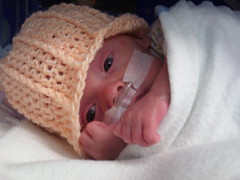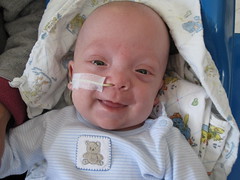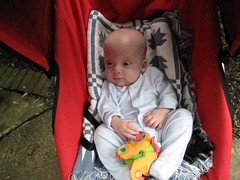Carolyn phoned in a report with more details on Max's first report card (see below). But first, the quick update: When Carolyn arrived the nurses had started Max's feed a little early. He was clearly hungry and actively rooting. They gave him a bottle and he sucked down all 10 ccs on offer. He did desat a little during the feed--this is his usual pattern and has led the NICU team to suspect Max of silent aspiration. Thus, today's scheduled barium swallowing study (now scheduled for 2:00 PM). But I think this is the first time that Max managed to swallow all 10 ccs.
Carolyn pulled aside physical therapist A. for more information on Dr. Kz's assessment from yesterday. All kidding aside, Dr. Kz did paint a pretty grim picture. Physical therapist A. agreed that, given Max's head bleeds, hydrocephalus and generally difficult course, he would have to be closely watched. That said, her view was far less dire than the impression we'd taken away from Dr Kz's assessment. Indeed, A. went so far as to imply that most parents react to Dr Kz's analyses the way we did. In short, Dr Kz is a notoriously tough grader. (Some of my favorite teachers were tough graders: nothing wrong with that, but it's good to know what the curve is.) The assessment itself is physically tough on babies--they're woken up, unswaddled and the manipulated, forced to endure lights being shone in the eyes and so on.
To recap, Dr Kz identified two main areas of concern: Max's autonomous nervous system (ANS) and what she identified as an abnormal motor system. Dr Kz was concerned that Max could not seem to regulate his breathing following a feeding or being jostled. A agreed that Max does indeed desat often, but that he was improving over time. Max does manage to eventually calm himself these days, a trick he didn't know a month ago.
On Max's abnormal motor system, A agreed that she'd like to see Max move his arms, legs and head more. As she pointed out, though, Max is spending a lot of mental and physical energy just figuring out how to breathe. Moreover, he does sometimes bicycle his legs, wave his arms around and lift his head. Furthermore, as we know, he has a very big head, so it's to be expected that he'd have trouble moving it around. A really encouraged us to help Max gain control of his arms and legs, and to do some tummy time style neck exercises with him.
Perhaps the most reassuring thing that A told Carolyn was that she didn't see any of the big red flags that point towards cerebal palsy (CP). For example, if Max's legs were always stiff, or always floppy, A would be far more concerned. Further, A has watched Max make significant progress over time. A cautioned that the real test will be when Max is six months old. If, at that time, he hasn't managed to get his ANS organized or gain control of his arm, leg and neck muscles, his problems might be fairly severe.
Mainly, we're relieved that A., who has been watching Max almost as long as we have, had come to some of the same conclusions we had. Namely, Max has had a truly rough course in the NICU, that he got off to a slow start, but that he's headed in the right direction and just, somehow, doesn't seem like a baby with major problems.
skip to main |
skip to sidebar

Max was born in October 2008 at Georgetown University Hospital. After more than four months at GUH, Max moved to the HSC Pediatric Center in March 2009. He came home six months after he was born, in April 2009.
A TUBE-FREE MORNING

Start Here: A list of posts with background information
- We're home! (leaving the hospital with Max)
- The hospital at home (what it's like to care for Max at home)
- Max in action (see Max do his tricks)
- How is Max? (update April 2009)
Most recent photos of Max
Blog Archive
-
▼
2008
(100)
-
▼
December
(69)
- Evening update (Wednesday 12/31)
- Evening update (Tuesday 12/30)
- Morning update (Tuesday 12/30)
- Max's first report card (Monday 12/29)
- Evening Update (Sunday 12/28)
- Playing Possum
- Evening update (Saturday 12/27)
- Max in the step-down NICU
- Late night update (Friday 12/26)
- Video of Max at the NIC unit on Christmas Day
- Max in his NICU crib
- Morning update (Thursday 12/25)
- Midday update (Wednesday 12/24)
- Morning update (Wednesday 12/24)
- Evening update (Tuesday 12/23)
- How the NICU has changed us
- Late night update (Monday 12/22)
- Evening update (Monday 12/22)
- Midday update (Monday 12/22)
- Afternoon update (Sunday 12/21)
- Evening update (Saturday 12/20)
- Evening Update (Friday 12/19)
- Evening Update (Thursday 12/18)
- Morning update (Thursday 12/18)
- Evening update (Wednesday 12/17)
- Late afternoon update (Wednesday 12/17)
- Mid-morning update (Wednesday 12/17)
- Morning update (Wednesday 12/17)
- Evening update (Tuesday 12/16)
- Afternoon update (Tuesday 12/16)
- Midday update (Tuesday 12/16)
- Bonus late-night post (12/15)
- Evening Update (Monday 12/15)
- Morning update (12/15)
- Evening update (Sunday 12/14)
- Max's new home, explained
- Afternoon update (Sunday 12/14)
- Evening update (Saturday 12/13)
- Morning update (Saturday 12/13)
- Guide to Max's new environment
- Late night update (Friday 12/12)
- What is the NICU like?
- P.S. (Thursday 12/11)
- Evening update (Thursday 12/11)
- Midday update (Thursday 12/11)
- Evening update (Wednesday 12/10)
- Midday update (Wednesday 12/10)
- Bonus head circumference post
- Evening update (Tuesday 12/9)
- Bonus update (Tuesday 12/9)
- Morning update (Tuesday 12/9)
- Phrenology
- Evening Update (Monday 12/8)
- Morning update (Monday 12/8)
- Evening update (Sunday, 12/7)
- Evening update (Saturday 12/6)
- Morning update (Saturday 12/6)
- Evening update (Friday 12/5)
- Midday update (Friday 12/5)
- Morning update (12/5)
- Evening update (Thursday, 12/4)
- How is Max?
- Morning update (Thursday 12/4)
- Evening update (Wednesday, 12/3)
- Midday update (Tuesday 12/3)
- Evening update (Tuesday 12/2): Some relief
- Midday update (Tuesday 12/2)
- Evening update (Monday 12/1)
- Midday update (Monday 12/1): Bring on the prune juice
-
▼
December
(69)



